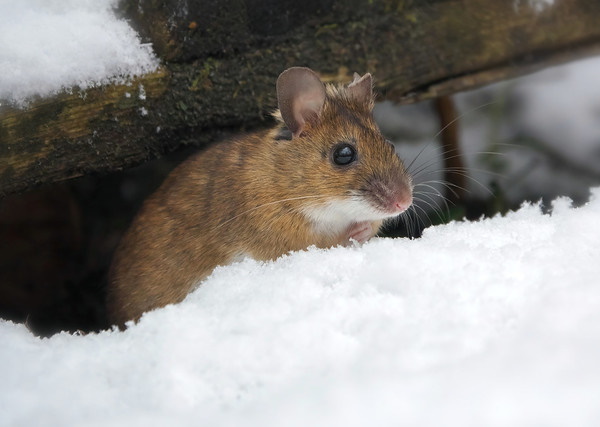Let’s hear it for mice – tiny furry mammals favored by cats, feared by elephants and found almost anywhere in the world… including Disney World.
Yellow-necked Mouse
If your species facilitates the spread of tick-borne encephalitis in humans, you just might be a red-er, Yellow-necked Mouse! The Yellow-necked Mouse (Apodemus flavicollis) also acts as a reservoir species for the Dobrava virus (an infectious hantavirus found in rodent excrement), thus proving what an efficient multitasker this li’l cutie is. On the bright side, this close relative of the Wood Mouse actually does have yellowish fur around its neck, along with slightly larger ears compared with common house mice and field mice. (images at top via Andrey Gulivanov and above via Donald Hobern)
* Mini Mouse Factoid: When it’s not spreading debilitating viral illnesses – or, even when it is – the Yellow-necked Mouse may be found in rugged or mountainous areas of Europe ranging from southern England eastward to the foothills of Russia’s Ural Mountains.
Florida Mouse
No, not THAT Florida mouse… the Florida Mouse (Podomys floridanus) inhabits some of the Sunshine State’s hottest and most arid regions. Also known as the Florida Deermouse, the Big-eared Deermouse or the Gopher Mouse, this mouse is easily identified by its brown-to-orange fur contrasting with off-white underparts. Don’t get too close: the Florida Mouse might not infect you with anything but it IS a Near Threatened species, due to increasing encroachment by human-driven land development. (image via Bill Chitty)
* Mini Mouse Factoid: The Florida Mouse carries the unique distinction of being the only mammalian genus found ONLY in Florida, and nowhere else. For the Florida Mouse at least, it’s a small world after all!
Apache Pocket Mouse
Mother Nature frowns upon your pink-eyed lab rat shenanigans and offers instead, the Apache Pocket Mouse (Perognathus flavescens Apachii). This light-colored rodent (no “paleface” jibes here) calls the brilliant white sands of er, White Sands, New Mexico home. Along with hundreds of other animal species endemic to the region, the Apache Pocket Mouse has evolved increasingly lighter fur in order to blend in with the area’s bright white gypsum sand. (image via White Sands National Park)
* Mini Mouse Factoid: We’ll take this opportunity to reassure mouse-haters and associated squeamish types that so-called “pocket mice” do not hide in one’s pockets – and no, they’re not happy to see you either. Rather, the name refers to the fur-lined exterior cheek pockets these mouse species use to keep seeds dry while carrying them back to their burrows.
Think mice are less best friends and more pest enemies? Check out The Verminators: 7 Amazing Amusing Pest Control Signs!
